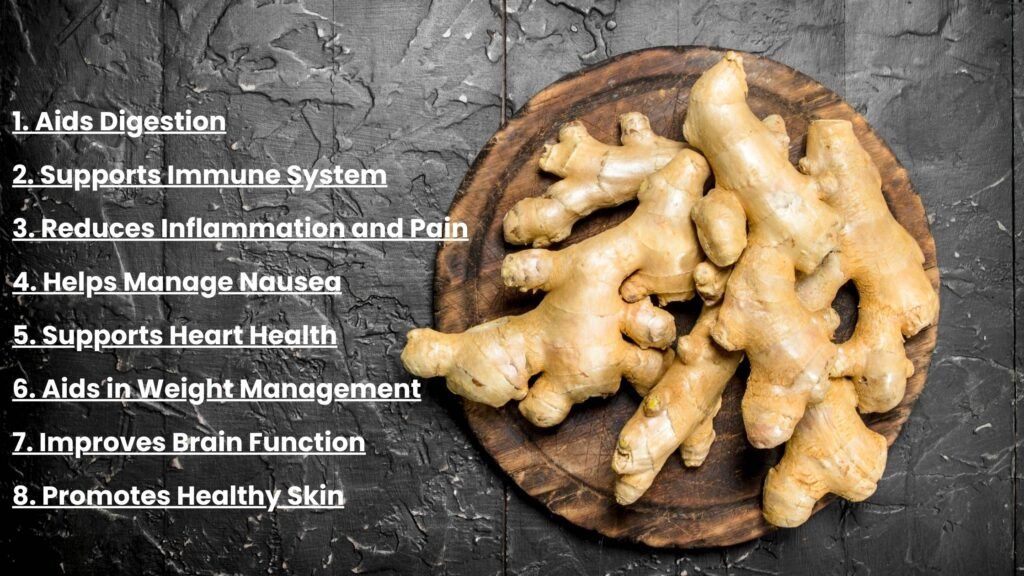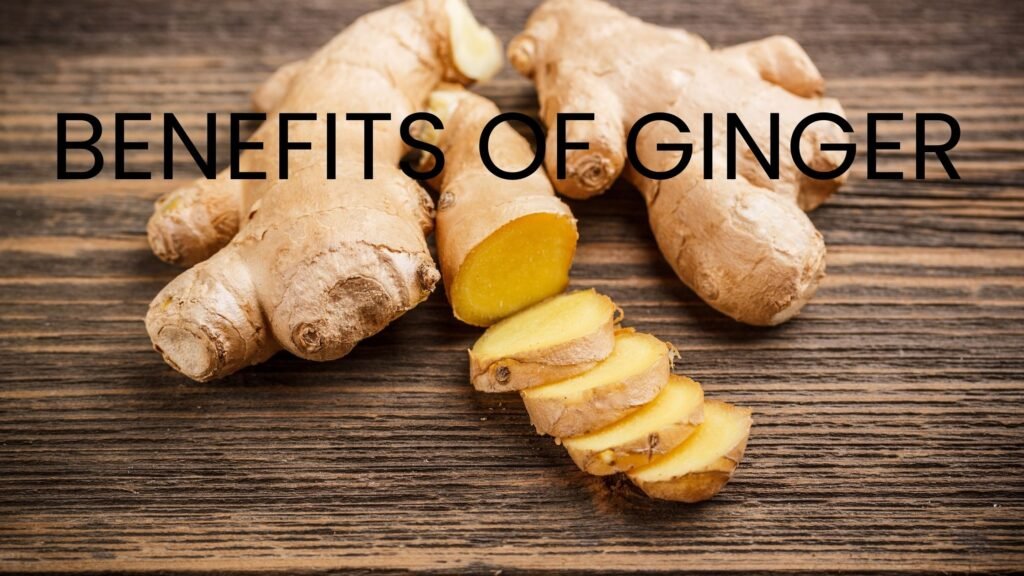Introduction
Ginger is a powerful root that has been used for centuries in traditional medicine and culinary practices worldwide. Known for its warm, spicy flavor and rich aroma, ginger has been a staple in Ayurvedic, Chinese, and herbal medicine for its ability to support overall health and well-being. From soothing digestive issues to reducing inflammation, this versatile spice is packed with beneficial compounds like gingerol, which contribute to its medicinal properties.
Beyond its role in natural healing, ginger is also widely used in cooking, teas, and health supplements. Its growing popularity in modern wellness trends has led to a surge in ginger-based products, making it easier than ever to incorporate this superfood into daily life. Additionally, dietary ginger, with its components like [6]-gingerol and zerumbone, has been shown to exhibit anticancer properties through various mechanisms, including antioxidant activities that inhibit tumor growth and reduce oxidative stress.
In this article, we’ll explore eight key benefits of ginger, highlighting how it can support digestion, boost immunity, reduce inflammation, and promote overall health. Whether you’re sipping on ginger tea or adding fresh ginger to your meals, this root has incredible advantages that can enhance your well-being naturally. Let’s dive into the benefits of ginger and why it deserves a place in your diet!
What is Ginger Root?
Ginger is a flowering plant that belongs to the Zingiberaceae family, with its root (rhizome) being the most commonly used part. This root has been valued for centuries in traditional medicine and cooking due to its strong flavor, warming properties, and numerous health benefits. The key active compound in ginger is gingerol, a bioactive substance known for its powerful antioxidant and anti-inflammatory effects. Other compounds like shogaols and zingerone also contribute to ginger’s medicinal properties.
Ginger can be consumed in various forms, making it a versatile ingredient in both food and health remedies. It is commonly used:
Fresh – Added to dishes, smoothies, or teas for a bold and spicy kick.
Dried or powdered – Used in spice blends, herbal teas, and cooking. Ginger powder is particularly noted for its anti-inflammatory effects in conditions such as osteoarthritis and cardiovascular health.
Ginger tea – A soothing beverage made by steeping fresh or dried ginger in hot water.
Supplements – Available in capsule or extract form for those looking to experience its benefits in a more concentrated dose.
Candied or pickled – Used as a snack or accompaniment in different cuisines.
With its wide range of uses and impressive health benefits, ginger has become a popular natural remedy for improving digestion, reducing inflammation, and supporting overall wellness. Whether consumed in food, beverages, or supplements, this root remains a powerhouse of nutrition and healing properties.
Definition and Origin of Ginger
Ginger is a perennial plant native to Asia, belonging to the Zingiberaceae family. Its scientific name is Zingiber officinale. The plant’s rhizome, commonly referred to as the ginger root, is widely used as a spice, flavoring agent, and herbal medicine. Ginger has been cultivated for over 3,000 years, with its origin dating back to ancient India and China. This versatile root has played a significant role in traditional medicine, particularly in Ayurvedic and Chinese practices, where it has been used to treat a variety of ailments. Its warm, spicy flavor and numerous health benefits have made it a staple in both culinary and medicinal applications worldwide.
Forms of Ginger: Fresh, Dried, and Powdered
Ginger is available in various forms, each with its unique characteristics and uses. Fresh ginger is the most commonly consumed form, often used in cooking and herbal remedies. Its pungent, spicy flavor adds a zesty kick to dishes and beverages. Dried ginger is obtained by drying fresh ginger, which helps preserve its flavor and aroma. This form is often used in spice blends and herbal teas. Powdered ginger, also known as ground ginger, is made by grinding dried ginger into a fine powder. This form is particularly popular in baking, cooking, and as a dietary supplement. Each form of ginger offers distinct advantages, making it easy to incorporate this beneficial root into your daily routine.
Brief History of Ginger Use
Ginger has a rich history that spans thousands of years, deeply rooted in traditional medicine across various cultures. In ancient China, ginger was revered for its ability to treat a multitude of ailments, from colds and fever to digestive issues. Chinese herbalists often prescribed ginger to improve circulation and boost overall vitality. Similarly, in India, ginger played a crucial role in Ayurvedic medicine, where it was used to balance the body’s doshas, reduce inflammation, and enhance digestion. The Greeks, too, recognized ginger’s medicinal properties, using it to alleviate nausea and vomiting, particularly during long sea voyages.
Today, ginger’s health benefits are well-supported by scientific research, validating its traditional uses. Whether you’re dealing with nausea, digestive discomfort, or inflammation, ginger remains a go-to natural remedy, just as it was in ancient times.
Nutritional Profile of Ginger Root
Ginger root is a nutrient-rich food, providing a range of essential vitamins, minerals, and antioxidants. As per the United States Department of Agriculture (USDA), the content of 100 grams of fresh ginger root is:
Energy: 80 kcal
Carbohydrates: 17.77 g
Fiber: 2.0 g
Protein: 1.82 g
Fat: 0.75 g
Sodium: 2 mg
Potassium: 415 mg
Vitamin C: 4.6 mg
Vitamin B6: 0.1 mg
Magnesium: 43 mg
Manganese: 0.2 mg
This impressive nutritional profile highlights the health benefits of incorporating fresh ginger root into your diet. Its low calorie and fat content, combined with a good amount of fiber, make it a healthy addition to meals. The presence of essential vitamins and minerals further enhances its value as a superfood.
Vitamins and Minerals in Ginger
Ginger is a good source of several essential vitamins and minerals, including:
Vitamin C: Important for immune function, skin health, and iron absorption.
Vitamin B6: Involved in many bodily processes, including energy metabolism and nerve function.
Magnesium: Crucial for muscle and nerve function, as well as bone health.
Manganese: Plays a role in enzyme function, wound healing, and bone health.
Potassium: Helps regulate blood pressure and supports overall cardiovascular health.
These nutrients contribute to ginger’s ability to support various aspects of health, from boosting immunity to maintaining strong bones and a healthy heart.
Antioxidant Properties of Ginger
Ginger contains a range of antioxidants, including gingerol, shogaol, and paradol. These compounds exhibit anti-inflammatory and antioxidant properties, potentially offering protection against chronic conditions like heart disease, cancer, and neurodegenerative diseases. The antioxidants in ginger work by neutralizing harmful free radicals in the body, reducing oxidative stress, and promoting overall health.
Bioactive Compounds in Ginger
Ginger contains several bioactive compounds, including:
Gingerol: Responsible for ginger’s anti-inflammatory and antioxidant effects.
Shogaol: Has anti-inflammatory and antioxidant properties, and may help reduce nausea and vomiting.
Paradol: Has anti-inflammatory and antioxidant effects, and may help reduce pain and inflammation.
Zingiberene: Has anti-inflammatory and antioxidant properties, and may help reduce nausea and vomiting.
These bioactive compounds are responsible for ginger’s medicinal properties and health benefits, including reducing nausea and vomiting, alleviating pain and inflammation, and supporting digestive health. By incorporating ginger into your diet, you can take advantage of these powerful compounds to enhance your overall well-being.
Health benefits of ginger

1. Aids Digestion
Ginger is widely known for its ability to support digestive health and relieve common stomach discomforts. It has been used for centuries as a natural remedy to soothe indigestion, reduce bloating, and combat nausea. Studies also indicate that blood sugar ginger can lead to significant reductions in fasting blood sugar and HbA1c, which are important markers for diabetes management.
Relieves nausea and bloating – Ginger is particularly effective in easing nausea, whether from motion sickness, morning sickness during pregnancy, or chemotherapy side effects. It also helps reduce bloating by preventing gas buildup in the digestive system.
Stimulates digestive enzymes – Ginger encourages the production of digestive enzymes, which helps break down food more efficiently and improves gut health. This makes it beneficial for those suffering from slow digestion or discomfort after meals.
Soothes indigestion – The active compounds in ginger, particularly gingerol and shogaols, help relax the muscles of the gastrointestinal tract, reducing symptoms of acid reflux and stomach pain.
By incorporating ginger into your diet—whether through ginger tea, fresh ginger in meals, or supplements—you can naturally support digestion and keep your gut feeling light and comfortable.
2. Supports Immune System
Ginger is a powerful natural immune booster, packed with antioxidants and compounds that help the body fight infections and stay healthy. It has been used for centuries in traditional medicine to strengthen immunity and protect against illnesses.
Rich in antioxidants – Ginger contains gingerol, a bioactive compound with strong antioxidant properties that help neutralize harmful free radicals in the body. This reduces oxidative stress, which can weaken the immune system over time.
Fights infections naturally – Ginger has antibacterial and antiviral properties that make it effective against common colds, flu, and respiratory infections. Drinking ginger tea or adding fresh ginger to meals can help soothe a sore throat and speed up recovery.
Reduces inflammation – Chronic inflammation can suppress the immune system, making the body more vulnerable to infections. Ginger’s anti-inflammatory compounds help support a healthy immune response and may even reduce symptoms of inflammatory conditions.
By including ginger in your daily diet—whether in teas, soups, or smoothies—you can help strengthen your immune system naturally and keep illnesses at bay.
3. Reduces Inflammation and Pain
Ginger is widely known for its natural anti-inflammatory properties, making it an effective remedy for reducing pain and swelling. It contains gingerol, a bioactive compound with powerful anti-inflammatory and antioxidant effects, which can help manage chronic pain conditions.
Eases arthritis and joint pain – Studies suggest that ginger can help reduce pain and stiffness in individuals with osteoarthritis and rheumatoid arthritis. Its anti-inflammatory properties help lower swelling in the joints, making movement easier and more comfortable.
Relieves muscle soreness – Ginger is beneficial for athletes or anyone experiencing post-exercise muscle soreness. Consuming ginger regularly may help reduce muscle pain and speed up recovery after workouts.
Helps with menstrual cramps – Ginger has been shown to be as effective as some pain-relief medications in reducing menstrual pain and discomfort. Drinking warm ginger tea or taking ginger supplements can provide relief from cramps.
By adding ginger to your diet—whether in teas, meals, or supplements—you can help manage inflammation naturally and support overall pain relief.
Ginger can be used in several ways to help manage pain, thanks to its anti-inflammatory and analgesic properties. Here’s how:
1. Consuming Ginger:
As a Spice: Incorporate ginger into your meals. It can be added to soups, teas, coffee, and various dishes.
Ginger Tea: Drink ginger tea to alleviate pain.
Ginger Powder: Take ginger powder orally. A daily intake of about 2 grams for at least 11 days is recommended to feel the effects.
2. Topical Application:
Ginger Compress: Apply a hot ginger compress to the affected area. To make one:
Grate one ounce of ginger root and wrap it in a thin cotton cloth.
Boil a pot of water, then reduce the heat and add the ginger. Let it soak for at least five minutes.
Soak a small towel in the ginger water, wring out the excess, and apply it to the affected area. Cover with a dry towel to hold in the heat.
Repeat the process for about 15-20 minutes, re-soaking the towel as needed.
Ginger Oil Massage: Aromatic ginger oil can be used during a massage to reduce pain.
3. Conditions Ginger Can Help With:
Muscle Pain: Ginger can reduce muscle pain and soreness after exercise.
Osteoarthritis: Ginger’s anti-inflammatory properties can provide temporary relief from osteoarthritis pain.
Menstrual Cramps: Ginger has been shown to work as effectively as over-the-counter pain relievers like ibuprofen for menstrual cramps.
Toothaches: A ginger compress can help relieve toothaches.
General Inflammation: Ginger compresses can be used for swelling and inflammatory conditions such as intestinal inflammation, bronchitis, and bladder inflammation.
Important Considerations:
The effects of ginger are not immediate and may take some time to be felt.
A hot ginger compress should not be used more than once a week and should be avoided when a high fever is present.
While many studies suggest that ginger is likely beneficial for pain, further research is required to identify its precise benefits and optimal usage.
May Help with Osteoarthritis
Ginger’s potent anti-inflammatory properties make it a promising natural remedy for osteoarthritis, a condition characterized by joint pain and stiffness. Research has shown that ginger extract can significantly reduce pain and improve mobility in individuals with osteoarthritis. In fact, some studies suggest that ginger may be as effective as ibuprofen in alleviating osteoarthritis symptoms.
The active compounds in ginger, such as gingerol and shogaol, work to reduce inflammation and improve joint health. Incorporating fresh ginger into your diet, whether through meals, teas, or supplements, can provide relief from osteoarthritis pain and enhance your overall joint function. For those seeking a natural alternative to conventional pain relievers, ginger offers a safe and effective option.
4. Helps Manage Nausea
Ginger is a well-known natural remedy for relieving nausea and soothing the stomach. Its active compounds, particularly gingerol and shogaol, help regulate digestive processes and reduce nausea symptoms.
Effective for motion sickness – Ginger can help prevent dizziness, vomiting, and nausea caused by motion sickness. Drinking ginger tea or chewing a small piece of fresh ginger before traveling can help ease discomfort.
Relieves morning sickness – Pregnant women often use ginger to help with morning sickness. Research suggests that consuming ginger in small amounts can be a safe and effective way to reduce pregnancy-related nausea.
Aids post-surgery and chemotherapy recovery – Ginger has been shown to help reduce nausea and vomiting after surgery or chemotherapy treatments. It is often used as a complementary therapy to support digestion and recovery.
Calms an upset stomach – Whether from indigestion, overeating, or general discomfort, ginger helps soothe the stomach lining and promotes smooth digestion.
To benefit from ginger’s nausea-relieving properties, try sipping ginger tea, chewing fresh ginger, or taking ginger supplements.
5. Supports Heart Health
Ginger is beneficial for heart health, thanks to its ability to lower cholesterol, regulate blood pressure, and improve circulation. Its natural compounds help protect the cardiovascular system and reduce the risk of heart disease.
Lowers bad cholesterol (LDL) – High levels of LDL cholesterol can lead to clogged arteries, increasing the risk of heart disease. Studies suggest that ginger may help reduce LDL cholesterol levels, promoting overall heart health. Additionally, ginger supplementation has been shown to improve metabolic health, particularly in individuals with conditions such as type II diabetes and obesity.
Regulates blood pressure – Ginger contains compounds that help relax blood vessels, improving blood flow and reducing hypertension (high blood pressure).
Improves circulation – By enhancing blood flow, ginger helps reduce clot formation, lowering the risk of stroke and heart attacks.
Reduces inflammation in arteries – Chronic inflammation can damage arteries and increase the likelihood of heart disease. Ginger’s anti-inflammatory properties help protect the blood vessels and maintain healthy circulation.
To incorporate ginger into your heart-healthy routine, try drinking ginger tea, adding fresh ginger to meals, or taking ginger supplements as part of a balanced diet.
May Lower Blood Pressure
High blood pressure, or hypertension, is a common condition that can lead to serious health issues if left unmanaged. Fortunately, ginger may offer a natural solution. Studies have found that ginger extract can help lower blood pressure by relaxing blood vessels and improving blood flow. The active compounds in ginger, such as gingerol and shogaol, contribute to these beneficial effects.
Incorporating fresh ginger into your diet can be a simple yet effective way to support cardiovascular health. Whether you add ginger to your meals, sip on ginger tea, or take ginger supplements, this versatile root can help you maintain healthy blood pressure levels and reduce the risk of heart disease.
May Lower Blood Sugar Levels
For individuals with type 2 diabetes, managing blood sugar levels is crucial. Ginger has been shown to help in this regard by improving insulin sensitivity and reducing inflammation. Research indicates that ginger extract can lower fasting blood sugar levels, making it a valuable addition to a diabetes management plan.
The active compounds in ginger, including gingerol and shogaol, play a key role in these benefits. By incorporating fresh ginger into your diet, you can help regulate blood sugar levels and reduce the risk of complications associated with diabetes. Whether you choose to add ginger to your meals, enjoy it in tea, or take it as a supplement, this powerful root can support your overall metabolic health.
6. Aids in Weight Management
Ginger can be a valuable addition to a healthy weight management plan due to its ability to boost metabolism, promote fat-burning, and reduce appetite. Its natural compounds support digestion and help regulate hunger, making it easier to maintain a balanced diet.
Boosts metabolism and fat-burning – Ginger contains bioactive compounds like gingerol, which may help increase calorie burning and improve fat metabolism, supporting weight loss efforts.
Helps control appetite – Ginger can promote a feeling of fullness, reducing overeating and cravings. Drinking ginger tea or adding ginger to meals may help curb hunger and unnecessary snacking.
Aids digestion for better weight control – Proper digestion is key to weight management, and ginger helps stimulate digestive enzymes, reducing bloating and discomfort that can make you feel sluggish.
Balances blood sugar levels – Unstable blood sugar can lead to cravings and energy crashes. Ginger helps regulate blood sugar, preventing spikes that contribute to weight gain.
To include ginger in your weight loss routine, try drinking ginger tea before meals, adding fresh ginger to smoothies, or using ginger in cooking for an extra metabolism boost.
May Support the Liver and Reduce Liver Damage
Ginger’s health benefits extend to liver health as well. Studies have shown that ginger extract can reduce liver inflammation and improve liver function, making it a valuable ally for those with liver conditions. The active compounds in ginger, such as gingerol and shogaol, help reduce oxidative stress and inflammation, protecting the liver from damage.
Incorporating fresh ginger into your diet can support liver health and reduce the risk of liver disease. Whether you add ginger to your meals, drink ginger tea, or take ginger supplements, this natural remedy can help maintain a healthy liver and promote overall well-being.
By understanding and utilizing these additional health benefits of ginger, you can further enhance your wellness journey and enjoy the numerous advantages this remarkable root has to offer.
7. Improves Brain Function
Ginger is packed with powerful antioxidants that support brain health by reducing oxidative stress and inflammation, which are linked to cognitive decline and neurodegenerative diseases. Regular consumption of ginger may help boost memory, reduce mental fatigue, and support overall cognitive function.
Antioxidants that help protect against cognitive decline – Ginger contains compounds like gingerol and shogaol, which fight free radicals that can damage brain cells, potentially reducing the risk of Alzheimer’s and other neurodegenerative conditions.
Role in reducing stress and enhancing memory – Ginger has natural anti-inflammatory and neuroprotective properties that help lower stress levels, improve mental clarity, and support better memory retention.
May improve reaction time and cognitive processing – Studies suggest that ginger extract may enhance reaction speed and attention span, making it beneficial for focus and mental performance.
Helps reduce brain fog – By improving circulation and oxygen flow to the brain, ginger can help enhance mental clarity and concentration.
Incorporating ginger into your daily routine—whether as ginger tea, fresh ginger in meals, or ginger supplements—can support long-term brain health and cognitive function.
8. Promotes Healthy Skin
Ginger is a powerful natural remedy for achieving clear, youthful, and radiant skin. Packed with antioxidants, anti-inflammatory compounds, and skin-nourishing nutrients, ginger can help combat acne, skin irritation, and signs of aging.
How ginger fights acne and skin inflammation – Ginger contains antibacterial and anti-inflammatory properties that help reduce acne breakouts, redness, and swelling. It fights acne-causing bacteria and soothes irritated skin, making it a great natural remedy for those with sensitive or acne-prone skin.
Supports collagen production for youthful skin – The antioxidants in ginger, especially gingerol, help protect skin cells from free radical damage, slowing down signs of aging like wrinkles, fine lines, and sagging. Ginger also helps stimulate collagen production, which maintains skin elasticity and firmness.
Improves skin tone and reduces dark spots – Ginger is known for its skin-brightening properties, helping to fade scars, dark spots, and hyperpigmentation, giving the skin a healthy, even complexion.
Enhances blood circulation for a natural glow – Ginger promotes better blood flow, which helps deliver oxygen and nutrients to skin cells, leaving your skin glowing and refreshed.
Adding ginger tea, fresh ginger juice, or ginger-infused skincare products to your routine can help you achieve clearer, healthier, and more youthful-looking skin naturally.
How to incorporate ginger into skincare?
Ginger can be incorporated into your skincare routine in several ways, leveraging its antioxidant, anti-inflammatory, and antiseptic properties[1][4]. Here are some methods:
Direct Application of Ginger Juice: Apply ginger juice directly to affected areas using a cotton ball, leave it on for a few minutes, and then rinse with warm water.
Ginger Face Masks: Mix freshly grated ginger with natural ingredients like honey or lemon juice, apply to your face, and leave on for about 20 minutes before rinsing off.
Ginger and Essential Oil Blend: Combine ginger essential oil with a carrier oil like jojoba oil and apply to the skin, focusing on acne-prone areas.
Daily Cleanser: Use a cleanser that contains ginger extracts to keep your skin soft and free of impurities.
Toners and Serums: Look for toners and serums with ginger for its toning and antioxidant properties for regular use to help even skin tone.
* DIY Skincare Recipes: Incorporate a slice of fresh or freshly grated ginger into homemade face masks or scrubs to enhance antioxidant and anti-inflammatory benefits.
* Ginger Face Scrub: Create a scrub using 2 Tbsp olive oil, 4 Tbsp brown sugar, and 1 Tbsp ground ginger; gently scrub damp skin in small circular motions.
* For Scars: Place a small sliver of fresh ginger to any areas where skin is lighter than normal, and let it sit for 10 minutes every day.
You can also find ginger-infused serums and use ginger-infused oil as a moisturizer to hydrate the skin.
How often should one apply ginger to his skin for optimal benefits?
When applying ginger to the skin, it is important to start slowly and test how your skin reacts to the ingredient. If you don’t experience any irritation after 24 hours from a patch test, you should be good to go.
There is no specific guidance in the search results on how often ginger should be applied to the skin for optimal benefits. However, one source suggests applying a slice of fresh ginger root to the affected area until it dries, and repeating this twice a day until you begin to see improvement.
How to Use Ginger
Ginger is a versatile ingredient that can be consumed in multiple ways to enjoy its health benefits. Whether you want to boost digestion, reduce inflammation, or improve immunity, here are some easy ways to incorporate ginger into your daily routine:
1. Drink Ginger Tea
Steep fresh ginger slices in hot water for 5–10 minutes.
Add lemon and honey for extra flavor and benefits.
Great for soothing the stomach, boosting immunity, and warming the body.
2. Take Ginger Supplements
Available in capsules, powders, or extracts for convenience.
Ensure you choose high-quality, organic supplements for the best results.
Ideal for people who want to enjoy ginger’s benefits without its strong taste.
3. Eat Fresh or Raw Ginger
Chew a small piece of fresh ginger to help with nausea or digestion.
Grate fresh ginger into soups, salads, or smoothies for an added boost.
4. Use in Cooking
Add grated or sliced ginger to stir-fries, soups, and curries for a spicy kick.
Mix ginger into salad dressings, marinades, or sauces for extra flavor.
5. Try Homemade Ginger Remedies
For digestion: Mix grated ginger, lemon juice, and honey in warm water.
For sore throat: Combine ginger with warm water and honey for a soothing drink.
For inflammation relief: Apply a ginger-infused oil on sore muscles or joints.
By adding ginger to your diet or using it in home remedies, you can naturally improve your health and enjoy its many benefits!
Additional Tips for Maximizing Ginger’s Benefits
To get the most out of ginger’s powerful health benefits, consider these useful tips:
1. Best Times to Consume Ginger
For digestion: Take ginger before meals to stimulate digestive enzymes.
For nausea relief: Sip ginger tea or chew raw ginger in the morning or during travel.
For immunity boost: Drink warm ginger tea first thing in the morning or before bedtime.
For weight management: Consume ginger-infused water or tea before meals to control appetite.
For pain and inflammation: Use ginger in meals or as a supplement daily for consistent relief.
2. Pairing Ginger with Other Natural Remedies
Ginger + Lemon + Honey: A perfect blend for soothing sore throats, boosting immunity, and aiding digestion.
Ginger + Turmeric: A powerful combination for reducing inflammation and supporting joint health.
Ginger + Garlic: Works well in cooking and helps support heart health and immunity.
Ginger + Cinnamon: A great pairing for blood sugar regulation and metabolism support.
By timing your ginger consumption wisely and combining it with other natural ingredients, you can enhance its benefits and make it a valuable part of your wellness routine!
Conclusion
Ginger is a powerful superfood with a wide range of health benefits. From aiding digestion and boosting immunity to reducing inflammation, supporting heart health, and enhancing brain function, this versatile root can be a valuable addition to your daily routine. Its natural healing properties make it an excellent remedy for nausea, weight management, and even skin health.
Adding ginger to your diet is simple and beneficial. Whether you enjoy it as tea, in meals, smoothies, or supplements, this natural ingredient can help you stay healthy and energized.
Start incorporating ginger into your diet today and experience its incredible health benefits firsthand. Explore different ways to use ginger and make it a part of your wellness journey!




